News & Views
The Great Re-Think: a 21st Century Renaissance
Richard Gault reviews a book by writer and scientist Colin Tudge which sets out a new vision for agriculture based upon principles of unity and compassion.
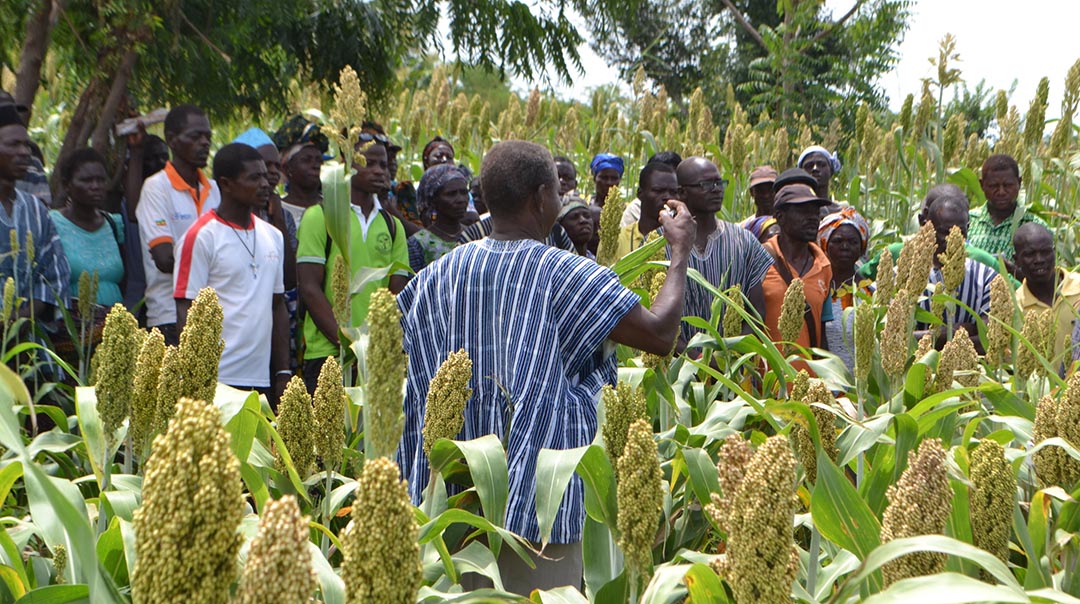
Members of the Ghanian farmers group CIKOD learn about ‘agroecology’ – farming which ‘centers on food production that makes the best use of nature’s goods and services while not damaging these resources’. Photograph: Daniel Banuoko, courtesy CIKOD / Groundswell International / Agroecology Fund [/]
In Martin Scorsese’s latest film, a documentary, the New York writer and wit Fran Lebowitz says that “there aren’t many upsides to being old [she’s 70] but here’s one. When you read that we’re gonna be out of water in 2050 … you first think, ‘Oh, my God.’ And then you think: ‘2050? I’ll be dead. Let someone else worry about it.’” [1]
The author of the book reviewed here will also be dead by then. Colin Tudge is seven years older than Fran Lebowitz and yet he does worry about 2050 and far, far beyond. Why? Because, as is apparent through his writing, Tudge is a man of enormous compassion. His concern is not for himself but for the well-being of humanity and for the planet we share with billions of other living beings – for the present, for the debt we owe to the past and for the responsibility we all have for the very long-term future, which he sees not in terms of decades but millions of years.
Tudge is well-known as a broadcaster and science writer with a particular interest in agriculture and food, publishing many popular books on the subject, such as Feeding People is Easy [2] and Six Steps Back to the Land.[3] He begins, like Fran, with bad news and there is no shortage of it. It is a list with which we are mostly and rather depressingly familiar: pandemics and disease; wars, pollution (“killing more than malaria, AIDS, tuberculosis, war, and violence combined” p. 40); climate change; mass extinction of species; poverty, inequality and injustice; and ever rising human numbers adding to the stress (already “a billion are chronically undernourished” p. 21).
But unlike Fran, he follows bad news with good, dispelling a series of myths about our future possibilities. The first of these concerns food supplies. Feeding the current and maximum future predicted population (11 billion) is in principle not a problem, Tudge feels, so we can strike Malthusian starvation off the list of future problems. “The myth is perpetrated that the world needs more and more food whereas in truth […] the world already produces about twice as much as we need [so that] agricultural strategy today […] is designed in large part to dispose of arable surpluses” (p. 105).
How are such nonsensical policies possible? And is there a way out? Yes, says Tudge, but it requires a ‘Great Re-Think’, a fundamental re-evaluation of who we think we are and of how we relate to one another and to the planet which supports us.
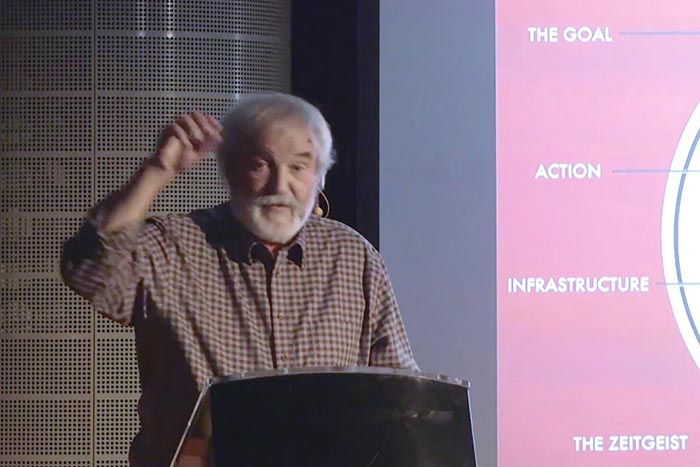
Colin Tudge, speaking in 2017 at the Advaya conference ‘The Future of Food in Britain and the Campaign for Real Farming’. For the full video, click here [/].
Where are we and how did we get here?
.
The Irishman who was stopped by a tourist asking for directions to Ballynanog answered, “Ballynanog, is it? Well, now, if I were going to Ballynanog I wouldn’t start from here.” But the thing is, we have no choice: we have to start from here however troubled the place is. Indeed we cannot take a step to a sustainable future without first truly and honestly understanding from where we start are and how we came to be here.
Tudge’s deep understanding of the paths that led to the troubled present is offered to us in clear and cogent detail. He tells us that we got here by two paths that humanity, particularly western humanity, travelled in parallel until they merged towards the end of the last century. One was the path of politics and economics; the other science and technology. The first began with Adam Smith in the 18th century and meandered via Charles Darwin in the 19th before culminating in Milton Friedman, Ronald Reagan and Margaret Thatcher. This is the path that led to neoliberalism. Neoliberalism is the economic and political theory that the success of business and commerce should be determined by the free market, unhindered by government. It is an amoral (if not immoral) philosophy where the winner takes all and the devil the hindmost – a philosophy in which ‘greed is good’ (quoting Gordon Gekko in Oliver Stone’s film Wall Street). Its view of humanity is that we are essentially competitive animals and draws support from the neo-Darwinian idea that life is a struggle for existence.
The second path began further back. Technology is as old as humankind, and science has its roots in the most ancient civilisations. Tudge gives excellent overviews of the evolution of both in Chapters 5 and 13.[4] The two disciplines began to merge from the fifteenth century following Francis Bacon’s insight that “knowledge is power”: science delivers the knowledge which gives technology its power. The combination has resulted in our modern, high-tech technology, which is very distinct from its craft-based predecessor.
Technology is now woven into our lives as never before. In very many ways it has delivered far more than Bacon could ever have anticipated, with astonishing successes in medicine, for example. Small wonder that technophilia characterises the mindset of so many, particularly those in government. This is “the unswerving faith in the present or potential power of technology to solve all our problems. […] It is the conceptual counterpart of scientism – the belief that science tells us or soon will tell us all that is worth knowing” (p. 123).
We are thus living in a world ruled by technophilia and neoliberalism and this Tudge sees as the root of our problems. “I suggest,” he writes, “that the combination of ultra-competitive metadarwinism, and ultra-modernist, ultra-competitive neoliberalism, coupled with an apparently absolute faith in the sanctity and power of science and high technology […] is now the greatest threat to humankind and all life on earth” (p. 65). It’s a “deadly combination” he reiterates later (p. 123).
In practice this combination, this faith in technology and the rightness of competition, has given rise to what Tudge calls “neoliberal-industrial agriculture”. Though “wonderfully successful in its own terms […] [it] emerges as a prime and sometimes sole cause of all [his emphasis] the world’s present disasters from social unrest and conflict and mass under-employment and depression to pollution and climate change to mass extinction” (pp. 138–9).
So if we are to move on towards the goal of “convivial societies in a flourishing biosphere” (p. 54) it seems that we need to free ourselves from the grip of technophilia and neoliberalism. How might we do this?
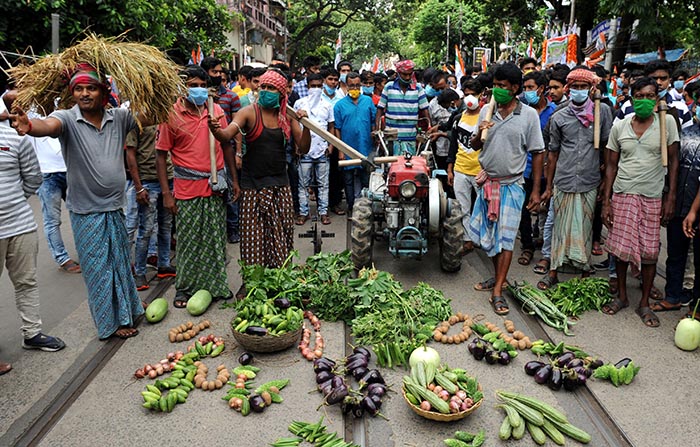
Indian farmers at a rally at the Trinamool Congress Student cell, protesting against farm bills in Kolkata which they believe will lead to large agri-businesses taking over their farms. Photograph: Dipa Chakraborty / Pacific Press Media Production Corp. / Alamy Live News, 23 Sep, 2020
Solutions
.
At one level it is a matter of politics, as Tudge explores in Chapter 9, ‘Governance’. The answer is simple: “The world is inevitably dominated by people who are obsessed with power and wealth. More: those who are so driven form a self-reinforcing positive feedback loop. […] Corporates make the wealth which governments rely upon and governments in turn smooth the path for the corporates and both support the kind of practical and intellectual endeavour that supplies the ideas that keep that cosy combination ahead of the global competition.” Hence “the prime political task for humankind is to break the feedback loop […] and expose the crude thinking that lies behind it” (pp. 215–6).
This crude thinking consists of a number of entrenched beliefs, two of which have already been alluded to: that competition is good and that morality need not be part of economics (hence Thomas Carlyle’s dismissal of it as “the dismal science”). But in fact we are not essentially competitive beings as neoliberalism presumes. Tudge busts this myth in Chapter 3 entitled ‘Can Human Beings really be convivial?’ Humans, he states, “are eusocial […] really social” (original italics, p. 66). He shows how we have evolved to be social animals and how to get the most from social life we must actively cooperate. He holds that “our ability to think and act collectively […] is humanity’s greatest asset” (p. 70). Hence his conclusion that “It is perverse in the extreme to adopt systems of politics and an economy that makes a prime virtue of competitiveness” (p. 80).
The architect of modern economics, Adam Smith, was a professor of moral philosophy, so it might seem ironic, as Tudge himself observes, that he should put forward a theory of economics which seems to be an amoral one – the idea that: “By pursuing his own interest [the trader] frequently promotes that of society more effectually than when he really intends to promote it.” [5] Smith’s theory was the outcome of what might be called a thought experiment: imagine a world in which there are an infinite number of sellers while buyers have perfect information about what is being sold, where, and at what price. Then the invisible hand of the market will weave its beneficent magic. However, the real world is not like Smith’s imaginary one: sellers are few and buyers have limited knowledge. Though Smith “believed in the essential goodness of human beings” (p. 226), putting this theory into practice in the real world has resulted in an economic system which gives licence to unregulated selfishness and rewards for ruthlessness which a minority have exploited (p. 228).
The fact is that trade and commerce cannot be conducted free of moral concerns. Re-thinking then must include a different economic theory, one which promotes cooperation and which is based on a very different morality than ‘greed is good.’ But what should this morality be? Tudge addresses this core question in Chapter 12 ‘Good for everyone: the universal morality’. The matter of what is right and what is wrong is a perennial question addressed in all religious traditions and by every school of philosophy. So, as Tudge remarks, the challenge is to “pick our way through the labyrinth of moral philosophising” (p. 265). He finds a way remarkably easily. He simply has sought “the virtues that have been accepted by most of humankind through most of known history and may indeed be seen as universal moral principles” (p.270). He identifies three: compassion, humility, and a reverence for the natural world.
Compassion Tudge describes as “the chief of all the virtues” (p. 277). He sees it as embracing kindness, altruism and empathy; it is a virtue essential for cooperation and is the antithesis of selfishness. Compassion is central to a remarkably wide range of religions and philosophies. Islam and Buddhism emphasise it; Christian love is “in the same camp” (p. 272); Salvador Allende attempted to institute compassionate Marxism in Chile; the medieval principle of noblesse oblige was an expression of it. “What a pity it is,” Tudge concludes, “that the world is dominated by people who as a matter of policy have abandoned the one outstanding quality – compassion – that is essential for our and the world’s wellbeing.” (p. 273)
Humility, he argues, is necessary to check a misconstrued idea of rights and to guard against falling prey to hubris. Rather than assuming that we have rights as varied as the entitlement to happiness or to plunder the land, let us acknowledge that what we wish for has to be subject to larger concerns, such as the needs of others or of nature. Failure to do so can result in others or nature biting back. “Humility properly conceived is crucial, if we seriously want to live long term in a tolerable state, and to keep our fellow creatures in good heart.” (p. 276)
As for reverence for nature, he maintains that we have a duty of care for “the natural world […] that we are privileged to be alive in” (p. 276). Care requires living in harmony with nature. He writes that “very much like the Eastern concept of dharma […] that the universe is fundamentally harmonious and that it is incumbent on us to behave in ways that maintain or increase that harmony” (p. 276).
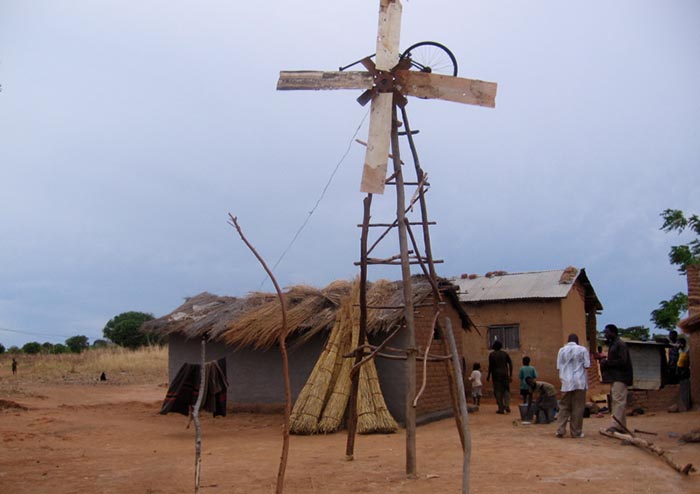
Appropriate Technology. The first windmill built by the Malawian inventor, William Kamkwamba, when he was still a teenager, to generate electricity for his family. The 2019 film The Boy Who Harnessed the Wind is based on his story. Photograph: Tom Rielly after William’s talk at TEDGlobal [/] in Tanzania in 2007, via Wikimedia Commons. See also William’s Windmill blog [/]
Science
.
Tudge assures us that he loves science (he calls it “the leitmotiv of my life” p. 280). “Truly, modern science is a triumph of humankind,” he declares (p. 279). He wants more of it, not less. In particular he argues strongly for ecology which “should be seen as the queen of the sciences” (p. 93). This is the science which is revealing just how complex and interdependent ecosystems are. For example, we are only now appreciating through science how extraordinary and how important fungi are in enabling life [see the interview with Merlin Sheldrake in Beshara Magazine]. This kind of knowledge is important if we want the ‘power’ to properly care for natural systems.
But science has also given us artificial fertilisers, plastics, pesticides and insecticides which have wrought untold harm to the biosphere. “Thus, one of humanity’s and the world’s greatest assets is now, at the same time, amongst its greatest threats” (p. 280). How can science be so failing us? Tudge argues that it is a great irony that although scientists know a lot about many things, the one thing few of them actually know much about is science itself – and the lay public knows even less. “Very few people – not even scientists who are seen as the guardians of science, and certainly not the politicians who largely decide the direction of scientific research – truly have a feel for science, what it is and isn’t, and what it can do and can’t” (p. 59). Why this ignorance of something so important? Because though Tudge believes that “science should never be taught without the philosophy of science”, in reality (p. 314) it usually is. Without understanding the limits of science too much misplaced faith comes to be invested in it.
What must we learn from the philosophy of science? Tudge gives a good introduction (pp. 314–22). In brief: it is incorrect to see science as rational and objective. Scientists are human and are subject to peer and social pressures. They do not rely on reason alone but make use of their intuition and imagination. Science cannot reveal the truth, only at best provisional approximations to it – maps are not the territory and are always subject to revision. Science can only work with what is measurable; it can only address questions asked of it and cannot deal with ‘unknown unknowns’.
But these limitations do not mean that science should be abandoned, but rather, that it should be applied carefully: “Always in our dealings with nature we must exercise the precautionary principle” (p. 97). Secondly, we should not be afraid (or should have the humility) to draw upon traditional knowledge and folk wisdom: “After all, folk wisdom at its best encapsulates the experience and insights of all humankind over thousands of years” (p. 180).
And then there is technology. Despite its undoubted significance, Tudge devotes relatively few pages to it: 18 (pp. 114–32) compared to 43 for science. This may reflect the fact that the philosophy of technology is even less well appreciated than the philosophy of science. He begins by defining technology as “all the things that help us to get to grips with the material world and make our lives easier […] Technology enables us to realize our full potential” (italics added, pp. 114–5). This is an exclusively anthropocentric definition which is at some variance with his advocacy of earth- or gaia-centric politics.
Tudge correctly sees that technology as practised “is for the most part hedonistic and strictly materialist” (p. 114), and that “small farmers and their families [are being] pushed aside by high-tech industrial farming” (p. 125). He concludes that what is needed is “appropriate technology”, technology which is “small scale, decentralized, labour-intensive, energy-efficient, environmentally sound, and locally autonomous” (p. 118), so not just anthropocentric.
However, this is one of the few areas where his understanding is limited, and he seems unaware that there are ways of understanding technology which might be usefully hitched to his cause. For example, the Heideggerian philosopher of technology Albert Borgmann contrasts the current form of technology which separates us from meaningful experiences with our surroundings (people, nature) with other kinds of technology which can deepens our engagement with the world.[6] A paradigmatic example is the difference between central heating and the wood-burning stove. Another would be the contrast between the high-tech farmer sitting at home programming his massive robot tractor and the gardener turning the earth with a spade: whose experience is richer? The contemporary form of technology (which Borgmann names “the device paradigm”) is more likely to harm nature than the alternative (characterised as “focal practices”) because the latter brings us in direct and intimate contact with the world. Borgmann’s is a technology which is holistic rather simply anthropocentric.
But whilst Tudge may be unaware of Borgmann, he shares with him a belief in the importance of food culture. He devotes a whole chapter to the importance of healthy eating (“plenty of plants, not much meat, and maximum variety” p. 178). We need to “re-learn the arts and crafts of cooking …. promote home cooking and to place cooking at the heart of school curricula” (pp. 178–9). Expressed in another way, Tudge wants cooking and eating to be focal practices just as Borgmann described in his own book.[7] But this correspondence is accidental (or intuitively reached) rather than being the product of a deep questioning of technology by Tudge.
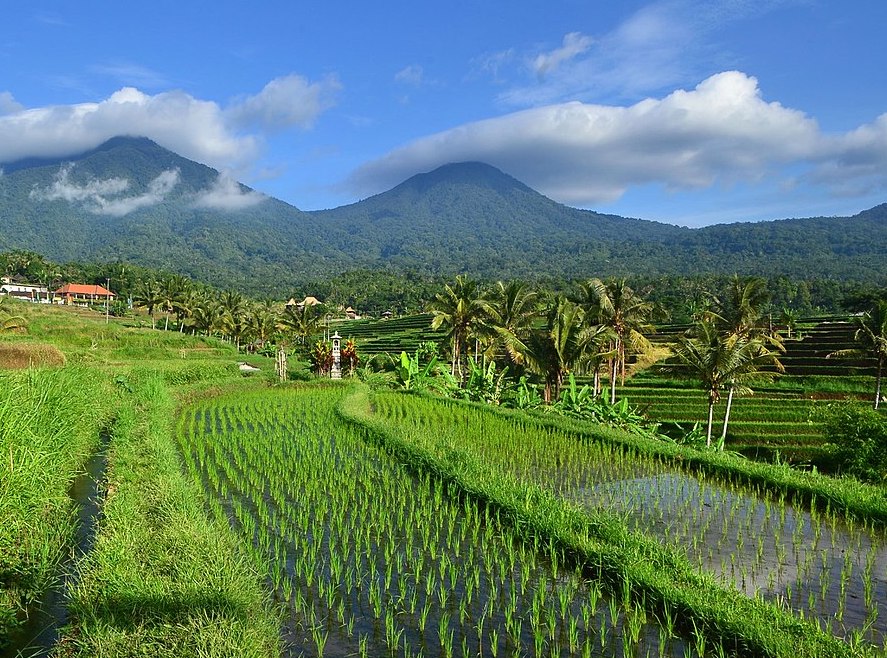
Jatiluwih in Bali, where the rice fields are watered by the Subak [/] traditional ecologically sustainable – and communally owned – irrigation system. The water management is under the authority of the priests in water temples, who practice Tri Hita Karana [/] Philosophy which is concerned with the correct relationship between humans, the earth and the gods. Photograph: Putu Andike Penendra via Wikimedia Commons
Re-thinking deeper still – metaphysics
.
At the start of the book Tudge tells us that “the modern combination of neo-liberal economics and uncritical technophilia are the greatest threat by far to the future of humanity and the biosphere” (p. 35) but by the end he seems to have arrived at another, deeper conclusion. He cites the distinguished polymath Seyyed Hossein Nasr [/] as stating that the loss of metaphysics is the greatest cause of the world’s present ills. “I think he’s right,” Tudge affirms (p. 324).
He goes on to explain that the way we understand the world and relate to it rests on our metaphysical beliefs, which we have, for the most part, absorbed unconsciously and uncritically from our culture. Furthermore, we are not encouraged to uncover or question them: metaphysics is not generally an essential part of any education programme apart from specialist philosophy courses. But a world suffering must be a world operating on flawed metaphysical beliefs. So in the final sections of The Great Re-Think he goes on to lay out what he thinks are the right, life-affirming, biosphere-supporting metaphysical principles.
The core belief he identifies is the idea of oneness, “the oneness of humanity; the oneness of all living creatures; the oneness of all that is” (p. 337). “We evolved to be part of the whole,” he writes (p. 339). Much of what Tudge advocates follows naturally from this principle. A key component of the “enlightened agriculture” he proposes in Chapter 6 is that each farm should be treated “as an ecosystem and treat agriculture as a whole, worldwide, as a key component of the biosphere” (p. 142). Further he explicitly recognises that “everything is linked to everything else […] we cannot put right the wrongs of food and farming just by focussing on farming” (p. 254). This means also getting economics, politics, law and society right.
Turning to economics, he states “We must take care of the biosphere. More: we must feel that we are part of it. […] The sense of oneness is a sine qua non and the economy must reflect this” (p. 238). Oneness translates too as eliminating the current obscene inequalities of wealth and income which his economic and political proposals would tackle. For example, he proposes that instead of farmland being owned by a few it should be held in trust by all. Currently 30% of English land is owned by the aristocracy; in Scotland fewer than 500 individuals own half the land. Tudge has calculated that all UK agricultural land could be bought on behalf of local communities for £ 5000 per head. This is affordable – the cost of a six-year old Skoda Octavia, as he puts it (p. 259). But the benefits would be enormous, as community owned land, he believes, is likely to be farmed in ecologically-sound ways and for the benefit of the population generally.
Perhaps a more controversial belief “is that consciousness is a quality of the universe” (p. 329). For him it is clear, “there is an underlying intelligence at work in the world, or indeed an all-pervasive intelligence that we should feel answerable to” (p. 276). This explains and justifies another of his metaphysical conclusions: “take nature as our guide” (p. 344). This is why he says that a key principle of agriculture should be “to emulate nature” (p. 142).
For example, he sees that “Nature is astonishingly diverse” (p. 145). Therefore, mixed farming is good, monoculture is not (p. 146). Since “the overall economy of nature is circular,” (p. 146) – an idea which is consistent with the idea of oneness – farms should be integrated so that ‘waste’ from one part sustains another (e.g. straw from cereals becomes feed for animals who in turn provide manure for the fields). Because “nature does not cultivate agriculture should aim for minimum tillage” (pp. 146–7). And so on.
And if consciousness is universal then perhaps there is more to Lovelock’s Gaia hypothesis than simply being a wise metaphor. In any event, as Tudge puts it, “No one would dig great chunks out of an animal and remove its vital organs and expect the rest to carry on as normal, in the way that we, for example, now mine the earth and obliterate rainforests. Thus the idea of Earth-as-organism is most salutary” (p. 100).
Lastly, metaphysics, as its name implies, reaches beyond the physical. Tudge argues for accepting that there is a transcendent reality: “there is more to the universe than meets the eye” (p. 328). Though not accessible by the methods of science, this hidden reality may be reached by through intuition and the imagination (pp. 339–42). These faculties allow us to sense the numinous, the divine presence at the heart of all religions. “Above all,” he says, “we need in some form or other to restore a sense of the sacred” (p. 109). So the reverence for nature that he calls for should be a reverence for something before which we can only display humility.

Farmers market, UK. These markets, which can now be found in most towns and cities, provide a way for small scale growers to sell produce directly to custmers without the intermediary of big business. Photograph: Paolo Paradiso/istock
What now?.
The Great Re-Think is a prescription for human beings to achieve a long, happy and sustainable future. Given that agriculture is what Tudge has devoted his long professional life to, it is not surprising that he regards farming and our attitudes towards food as fundamental. He points out that “Agriculture very obviously is our chief source of food […] Less obviously, it is the world’s biggest employer by far. It occupies a third of all land on earth […] it is right at the heart of all the world’s affairs both human and non-human” (p. 133)
He believes that there has to be a turn from neo-liberal industrial agriculture to an agriculture founded on the metaphysics and principles he has so well thought out. What he envisages combines the best of the sciences of ecology and microbiology with tradition artisanal skills, so it is skills intensive rather than relying on huge machinery and chemicals. It is likely to mean a move back to the land, as Tudge estimates it will require up to ten times as many farmers as the UK currently has. The aim too should be ‘food sovereignty’, freeing countries from dependence on food imports from far away.
Considering how to this change can come about, he feels that reform of our present system will not go far enough. But revolution is fraught with danger. His answer is what he calls “renaissance”: “build the alternative before the status quo is destroyed; so that when people jump ship they have somewhere to jump to” (p. 51). This is not as impractical as it might sound at first. There are, he reports, already as many as “10 million not-for-profit organisations […] seeking in some way to make the world a better place …” (p. 366). The largest is La Via Campesina [/], which represents more than 200 million peasant farmers. Tudge himself has established The College for Real Farming and Food Culture [/] as well as initiating the annual the Oxford Real Farming Conference [/]. The internet gives the possibility of coordinating these efforts worldwide, and provides a platform for education, which he sees as is crucial, emphasising that it should not overlook metaphysics, philosophy of science, cooking and gardening.
Tudge has produced an exceptional book. It is the product of a lifetime’s experience and an astonishing breadth and depth of reading, not to mention a good mind and a big heart. It is filled with wisdom, and also hope. The choice is now ours: join Fran Lebowitz and leave others to worry, or do our best to ensure future generations can enjoy a convivial, fulfilling and healthy future. Tudge has given us more than enough to work with.
The Great Re-Think: a 21st Century Renaissance was published by Pari Publishing, 2021.
You can learn more about Colin Tudge and the work of his College for Real Farming and Food Culture via the web-site http://collegeforrealfarming.org/.
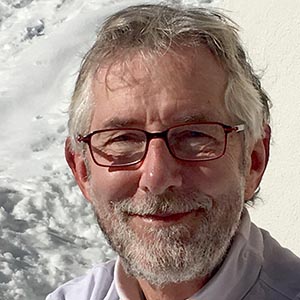
Dr Richard Gault has worked at universities in Scotland, Ireland, Holland and Germany, where he has taught and researched a variety of subjects, including the history and philosophy of science and technology
More News & Views
Don’t Take It Easy
Richard Gault is inspired by Michael Easter’s book The Comfort Crisis and explores the idea of ‘misogi’ during a 600-mile walk across Scotland
Book Review: ‘The Serviceberry’
Martha Cass contemplates the message of a new book by Robin Wall Kimmerer that advocates ‘an economy of gifts and abundance’
Book Review: ‘Conversations with Dostoevsky’
Andrew Watson engages with an innovative new book by George Pattison which explores Dostoevsky’s relevance in the contemporary world
Thich Nhat Hanh & the Poetry of Engaged Buddhism
Philip Brown presents the poem ‘Recommendation’ and comments on the potential of contemplative art to foster compassion
Introducing… ‘Perfect Days’ and ‘Nowhere Special’
Jane Clark watches two films with a contemplative theme
Book Review: ‘Irreducible: Consciousness, Life, Computers and Human Nature’
Richard Gault reviews a new book by Federico Faggin, one of the leading lights of the science of consciousness
FOLLOW AND LIKE US
——————————————
——————————————
——————————————
Sources (click to open)
[1] Pretend it’s a City, Episode 6, Netflix.
[2] COLIN TUDGE, Feeding People is Easy (Pari Publishing, 2007).
[3] COLIN TUDGE, Six Steps Back to the Land (Green Books, 2016).
[4] Tudge’s chapter on ‘A lightning history of science’ (pp. 282–314) is remarkably good. However, he does miss the importance of the 13th century invention of the mechanical clock. See my article in Beshara Magazine.
[5] Adam Smith in The Wealth of Nations, cited p. 226
[6] ALBERT BORGMANN, Technology and the Character of Contemporary Life (University of Chicago Press, 1984). A summary of the book can be found here [/]
[7] Borgmann explores ‘the culture of the table’ in Chapter 23. ‘Truly human eating is the union of the primal and the cosmic,’ he writes (p. 204), ‘the preparation of food draws near the harvesting and the raising of vegetables in the garden close by. […] The dish and the cook, the vegetable and the gardener tell of one another. […] Eating in a focal setting differs sharply from the social and cultural anonymity of a fast-food outlet.’ (p. 205).
If you enjoyed reading this article
Please leave a comment below.
Please also consider making a donation to support the work of Beshara Magazine. The magazine relies entirely on voluntary support. Donations received through this website go towards editorial expenses, eg. image rights, travel expenses, and website maintenance and development costs.
READERS’ COMMENTS
FOLLOW AND LIKE US
0 Comments